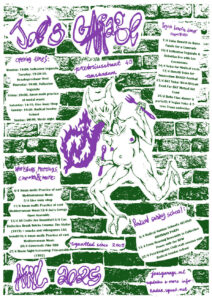Sunday April 22nd, 8pm filmnight: Hedwig and the Angry Inch
 Hedwig and the Angry Inch is a 2001 American musical comedy-drama film based on the stage musical of the same title about a fictional rock band fronted by an East German transgender singer. The film was adapted and directed by John Cameron Mitchell, who also portrayed the title role. The music and lyrics are by Stephen Trask.
Hedwig and the Angry Inch is a 2001 American musical comedy-drama film based on the stage musical of the same title about a fictional rock band fronted by an East German transgender singer. The film was adapted and directed by John Cameron Mitchell, who also portrayed the title role. The music and lyrics are by Stephen Trask.
Telos and Melos or Origins of Love, by James Tobias
Telos and Melos or Origins of Love
On her way from being a sideshow act entertaining scandal- seekers and startling diners at an unappetizing “homestyle buffet” cum rock club in middle American Kansas City, to receiving star billing in a swank New York City nightspot where she delivers an anthemic “last waltz” to America’s cultural capital, the eponymous heroine
of Hedwig and the Angry Inch (Mitchell, 2001) crosses territories both familiar to and untrammeled by fi lmic melodrama or musical biopic, rock musical or rockumentary. Public rancor and intimate division motivated in some imaginary holdover of Cold War superpower geopolitics; child abuse both sexual (by her father) and emotional (by her mother); surgical mutilation by a crank doctor; betrayal and abandonment at the hands of a fi rst love; lost homes and irretrievable origins; sex experienced as illicit, sad, angry, or failed relation of gendered, raced, and classed confl ict; delusions of star grandeur, tawdry tabloid fame, and celebrity stalking; stolen authorship and
misbegotten millions at Hedwig’s expense; emotional and physical manipulation of her closest friends, her lover, and her agent, to the extent of holding her ex- patriot band mates hostage and threatening them with deportation; a terrible car crash; an apparently only imagined reconciliation with her “better half”; after all this, the long
suffering, long suffered Hedwig disappears, stripped naked but for a small tattoo, into the dim light of an empty street. Along the way, there is more than simply a series of melancholic episodes alternating with stage spectacle in the narrative of this wounded, troubled person. Hedwig proceeds not by citing the narrative rules of melodrama or musical, but through multiple violations in both substance and form whereby those classical fi lm genres are filtered through post- classical formulae like rock opera and rockumentary to indicate in retrospect that the fates of those earlier genres have long been sealed. These later forms come undone too, presented neither in reverence to rock style as spectacular transgression (as the rock opera delivers in one way or another) nor in service to documenting the behind- the- scenes genius of the rock performer (the contract signed by the rockumentary). And as if Hedwig’s thorough plundering of pop music, fi lm style, and narrative form weren’t enough, the fi lm’s combinatoire of rock and drag as sex–gender perplexity, with its easy and constant deployment of marginal cinema and video musical forms and its encyclopedic proclivity for intertextual reference, also delights in the outright bastardization of classical texts (Plato’s Symposium) and sacrilegious invocation of the Bible (apparently, both standard and Gnostic). Musicality has held, for numerous critical and cultural accounts, a potentiality for,
or a critique of, utopian and dystopian imagining.3 For Adorno, musicality says “we,” in spite of music’s specifi c conditioning in historical production.4 But Hedwig’stake on generic and gendered expression as extended musical detour might seem more a dystopian crash of Deleuzian virtuality into the ubiquitous mediatedness of a con- temporary moment. The fi lm’s jagged, palimpsestic setting of Western philosophy, spirituality, and gender expression as a mediatic scrambling of past, present, and future modes suggests a lurching narrative engine outputting personhood as murderous telos, a failing actualization offset only in an occasional, momentary kaleidoscopics of selfhood exploding as musical epiphenomenon. And when Hedwig disappears, so disappears, perhaps, our potential for identifying personhood as anything but a fragmented, contingent self- awareness, the blind spot of a mediatic supersystem engineering “us” via an insistent program of melancholic immersion in false nostalgia alternating with a manic misdirection of spectatorial attention away from any secure ground where personhood might come to rest. So just what is it about the fi lm that makes it so much fun? How can it be called
“realistic,” as one Midwestern programmer of the fi lm justifi ed his presentation of Hedwig to high school students? And what is it about the fi lm that has inspired web pages far and wide, live re- performance in the cinemas of Los Angeles in the manner of The Rocky Horror Picture Show, and revivals of the original play? The short answer is that what matters in Hedwig’s story is melos, not telos. If the fi lm short- circuits the telos of personhood as a production of fi xed identity, as fetish or fi xation, then it is melos which provides a musical path through identity as fetish, though experience as programmed effect. The fi lm’s melos, before giving a path to each scene of musical self- imagining, also provides the vehicle to move along the narrative path, in order that we may pass along toward larger ends less easily discernible (of narrative, of historical determination). By melos I don’t mean, necessarily, the melodic shaping of acoustic material, or the properties of musical sequencing as opposed to those of unstructured noise. Instead, melos here unfolds narrative rhetorics in relation to a performative aesthetics. Hedwig’s ruse of melos is twofold: the fi lm takes drag as the face of affective mobility and pop music as the expression of an audience having been affected. Quoted from Melos,Telos, and Me. Transpositions of Identity in the Rock Musical , by James Tobias


 ANYTHING GOES! Music,…
ANYTHING GOES! Music,…
